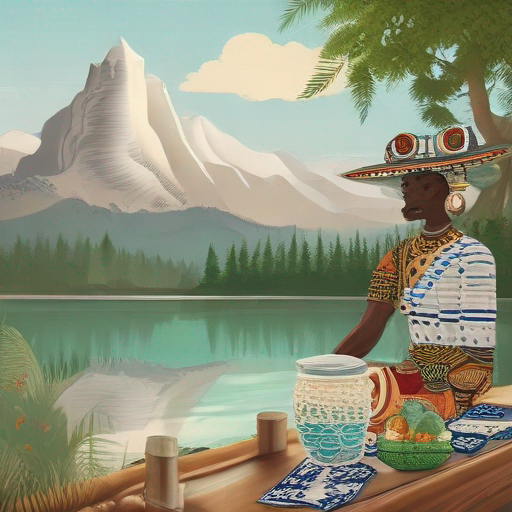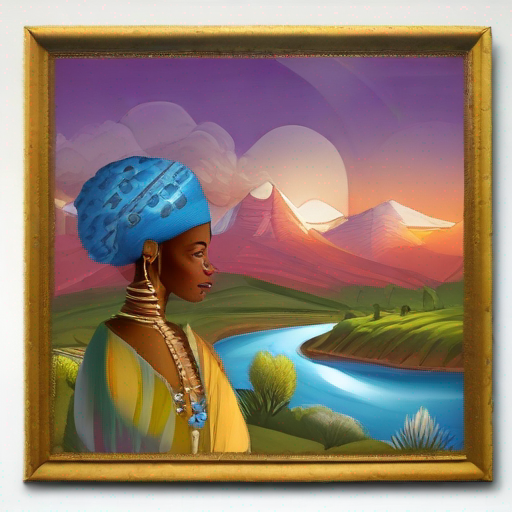
Nigerian Jewelry Sets: Adorn Yourself with Unique Cultural Treasures
Nigerian jewelry sets are a treasure trove of cultural significance, beauty, and craftsmanship. With a rich history and diverse cultural influences, Nigerian jewelry sets have evolved to become an integral part of the country's heritage. From intricate beadwork to stunning metalwork, these unique pieces are not only a testament to African culture but also a reflection of individual creativity.
Nigerian jewelry sets are often characterized by vibrant colors, bold patterns, and striking designs. Each piece is carefully crafted to tell a story, whether it's through the choice of materials, the shape, or the adornments. Whether you're looking for a statement piece or a subtle accessory, Nigerian jewelry sets have something to offer.
A Brief History of Nigerian Jewelry
Nigerian jewelry has its roots in ancient times, when beads and other decorative items were used to signify status, wealth, and spiritual power. The Yoruba people, for instance, have a long history of creating intricate beadwork pieces that are not only beautiful but also hold deep cultural significance.
Over time, Nigerian jewelry sets have been influenced by various cultures and traditions. The Hausa people, for example, are known for their exquisite metalwork, while the Igbo people are famous for their wood carvings. These influences have blended together to create a unique fusion of styles that is quintessentially Nigerian.
What Makes Nigerian Jewelry Sets Unique?
There are several factors that set Nigerian jewelry sets apart from others around the world. Here are just a few:
- Vibrant Colors: Nigerian jewelry sets are known for their bold, vibrant colors that evoke the country's rich cultural heritage.
- Intricate Designs: From beadwork to metalwork, Nigerian jewelry sets feature intricate designs that tell stories and convey meaning.
- Cultural Significance: Each piece is imbued with cultural significance, reflecting the wearer's status, wealth, or spiritual power.
- Handcrafted: Nigerian jewelry sets are often handcrafted by skilled artisans who have spent years perfecting their craft.
Types of Nigerian Jewelry Sets
There are many different types of Nigerian jewelry sets to choose from. Here are a few examples:
- Beadwork: Intricate beadwork pieces that can be worn as necklaces, bracelets, or earrings.
- Metalwork: Exquisite metalwork pieces that feature intricate designs and patterns.
- Wood Carvings: Beautiful wood carvings that can be worn as pendants, brooches, or charms.
- Adire Cloth: Adire cloth jewelry sets that combine traditional textile designs with modern accessories.
Wearing Nigerian Jewelry Sets
Whether you're looking to make a statement or simply want to add some cultural flair to your outfit, Nigerian jewelry sets are the perfect choice. Here are a few tips for wearing these unique pieces:
- Start with Something Simple: Begin with a simple piece like a necklace or earring and build from there.
- Mix and Match: Combine different pieces to create a unique look that reflects your personal style.
- Experiment with Layers: Try layering multiple pieces together to add depth and dimension to your outfit.
Frequently Asked Questions
Q: What makes Nigerian jewelry sets so unique?
A: The vibrant colors, intricate designs, cultural significance, and handcrafted nature of the pieces set Nigerian jewelry sets apart from others around the world.
Q: Are Nigerian jewelry sets only for special occasions?
A: Absolutely not! While Nigerian jewelry sets can certainly be worn for special occasions, they're also perfect for everyday wear or as a statement piece.
Q: Can I find Nigerian jewelry sets online?
A: Yes! You can find a wide range of Nigerian jewelry sets online through websites like nigerian jewelry sets.
Key Takeaways
- Nigerian jewelry sets are a unique and vibrant reflection of African culture.
- The pieces are often handcrafted by skilled artisans who have spent years perfecting their craft.
- There are many different types of Nigerian jewelry sets to choose from, including beadwork, metalwork, wood carvings, and adire cloth.
Table: Types of Nigerian Jewelry Sets
| Type | Description |
|---|---|
| Beadwork | Intricate beadwork pieces that can be worn as necklaces, bracelets, or earrings. |
| Metalwork | Exquisite metalwork pieces that feature intricate designs and patterns. |
| Wood Carvings | Beautiful wood carvings that can be worn as pendants, brooches, or charms. |
| Adire Cloth | Adire cloth jewelry sets that combine traditional textile designs with modern accessories. |
By incorporating Nigerian jewelry sets into your wardrobe, you're not only adding a touch of cultural flair but also supporting local artisans and preserving the country's rich heritage. Whether you're looking for a statement piece or simply want to add some African charm to your outfit, these unique pieces are sure to impress.








